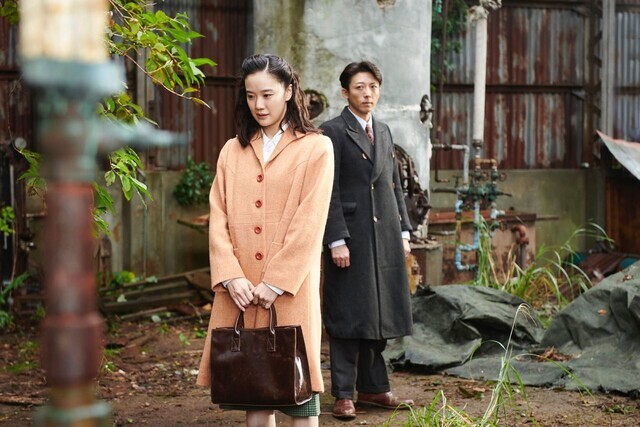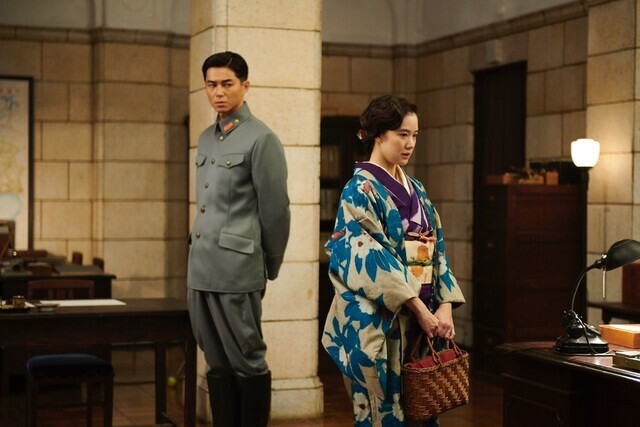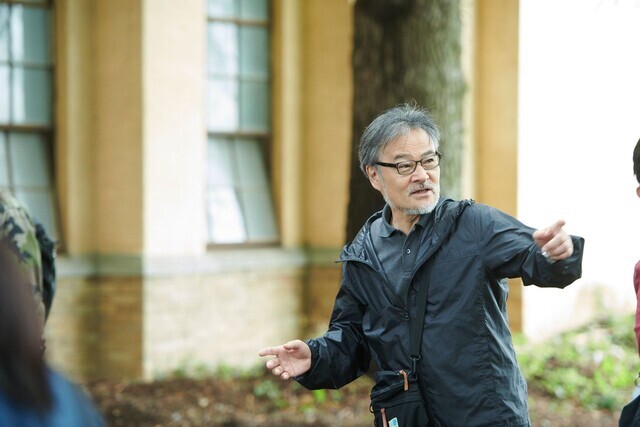hankyoreh
Links to other country sites 다른 나라 사이트 링크
Japanese director confronts Japan’s war crimes in “Wife of a Spy”

One of the films presented at the 2020 Busan International Film Festival (BIFF), which began on Oct. 21, is “Wife of a Spy,” a Japanese film confronting the country’s legacy of war crimes. The subject hardly ever comes up in contemporary Japanese films.
With the Japanese government still obsessed with sweeping war crimes under the rug and refusing to make official apologies to countries it has brutalized, making such a film must have required quite a bit of courage.
But Kiyoshi Kurosawa, the film’s director, described his work more modestly. “My film only adds elements of entertainment to the framework of historical facts. It didn’t require any amazing determination or bravery,” Kurosawa said in a digital press conference on Oct. 26.
“It’s up to the viewers to decide how this kind of story is linked to the present,” he added.

“Wife of a Spy” is set in 1940, shortly before hostilities broke out in the Pacific theater of World War II. While representing his trading company on a business trip to Manchuria, Yusaku (played by Issey Takahashi) is shocked and horrified to witness medical experimentation on living human beings and other war crimes committed by Japan’s notorious Unit 731, which specialized in biological and chemical warfare.
Yusaku makes up his mind to bring these events to the attention of the world, but his wife Satoko (played by Aoi Yu) asks him not to, out of fear that doing so would endanger their family. After struggling with the issue, Satoko changes her mind and takes personal action.
Along with Hirokazu Koreeda, Kurosawa is one of the best-known directors in Japanese cinema today. He’s well-known for inserting social messages into horror films and thrillers.
Kurosawa came to global prominence with the film “Cure” in 1997. Since then, he has been a mainstay at the Cannes Film Festival, winning various awards at the festival for “Pulse” (2001), “Tokyo Sonata” (2008), and “Journey to the Shore” (2015).
“Wife of a Spy” is Kurosawa’s first historical drama. It isn’t dedicated to delving into Japan’s war crimes per se. Rather, it uses the dual lens of suspense and melodrama to examine the couple’s struggle about how to reveal what they’ve learned.
“Rather than trying to send some kind of political message, I tried to face up to a historical period and create an entertaining film based on that,” Kurosawa said.
Kurosawa responded with humility to a question about whether the film should be taken as a conscientious appeal for Japan to reckon with its past. “I would be personally gratified for it to be taken that way, but the film isn’t some new revelation of something that’s been covered up. I only attempted to faithfully present facts that are already known.”

As can be seen from its title, the film’s main character is not the principled husband but his wife. “I managed to express what ordinary Japanese wrestled with and the lives they lived through the perspective not of the spy but of his wife,” Kurosawa explained.
“Wife of a Spy” was broadcast as a TV drama on NHK this past June and was released in Japanese theaters on Oct. 16. Kurosawa offered the following thoughts about the film’s reception in Japan.
“Most ordinary households weren’t able to watch the drama when it was broadcast because few of them have the equipment needed for the 8K high-resolution digital format. More people are watching it now that it’s out in theaters, but it hasn’t gotten a lot of attention yet.”
But the film has received considerable attention outside of Japan. Last month, it won the Silver Lion at the 77th Venice International Film Festival.
“I was really delighted, since this was the first time I’ve won a big award. The award was for the film’s direction, but I think of it as recognizing everyone who took part in the film,” Kurosawa said.
“It didn’t feel real since I wasn’t able to be there in person. I’m such a fan of Kate Blanchett, who was the main judge, and it would have been so exciting to physically receive the trophy from her.”
Kurosawa is also looking forward to his film’s upcoming release in South Korean theaters. “I think Koreans should be free to assess the points of connection between the present and the painful wars of the past,” he said.
By Suh Jung-min, music correspondent
Please direct comments or questions to [english@hani.co.kr]

Editorial・opinion
![[Column] Has Korea, too, crossed the Rubicon on China? [Column] Has Korea, too, crossed the Rubicon on China?](https://flexible.img.hani.co.kr/flexible/normal/500/300/imgdb/original/2024/0419/9317135153409185.jpg) [Column] Has Korea, too, crossed the Rubicon on China?
[Column] Has Korea, too, crossed the Rubicon on China?![[Correspondent’s column] In Japan’s alliance with US, echoes of its past alliances with UK [Correspondent’s column] In Japan’s alliance with US, echoes of its past alliances with UK](https://flexible.img.hani.co.kr/flexible/normal/500/300/imgdb/original/2024/0419/2317135166563519.jpg) [Correspondent’s column] In Japan’s alliance with US, echoes of its past alliances with UK
[Correspondent’s column] In Japan’s alliance with US, echoes of its past alliances with UK- [Editorial] Does Yoon think the Korean public is wrong?
- [Editorial] As it bolsters its alliance with US, Japan must be accountable for past
- [Guest essay] Amending the Constitution is Yoon’s key to leaving office in public’s good graces
- [Editorial] 10 years on, lessons of Sewol tragedy must never be forgotten
- [Column] A death blow to Korea’s prosecutor politics
- [Correspondent’s column] The US and the end of Japanese pacifism
- [Guest essay] How Korea turned its trainee doctors into monsters
- [Guest essay] As someone who helped forge Seoul-Moscow ties, their status today troubles me
Most viewed articles
- 1[Column] The clock is ticking for Korea’s first lady
- 2Samsung barricades office as unionized workers strike for better conditions
- 3[Correspondent’s column] In Japan’s alliance with US, echoes of its past alliances with UK
- 4After 2 months of delayed, denied medical care, Koreans worry worst may be yet to come
- 5[Column] Has Korea, too, crossed the Rubicon on China?
- 6Hong Se-hwa, voice for tolerance whose memoir of exile touched a chord, dies at 76
- 7US overtakes China as Korea’s top export market, prompting trade sanction jitters
- 8All eyes on Xiaomi after it pulls off EV that Apple couldn’t
- 9[Photo] Smile ambassador, you’re on camera
- 10[News analysis] After elections, prosecutorial reform will likely make legislative agenda